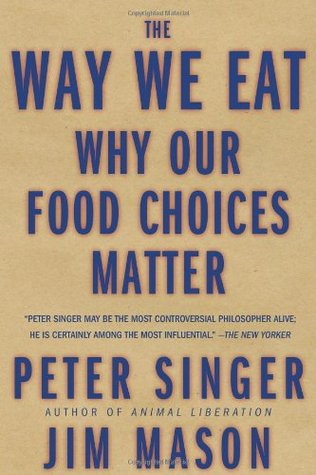328 pages
English language
Published Sept. 18, 2006 by Rodale, Distributed to the trade by Holtzbrinck Publishers.

328 pages
English language
Published Sept. 18, 2006 by Rodale, Distributed to the trade by Holtzbrinck Publishers.
A thought-provoking look at how what we eat profoundly affects all living things--and how we can make more ethical food choices
Five Principles for Making Conscientious Food Choices 1. Transparency: We have the right to know how our food is produced. 2. Fairness: Producing food should not impose costs on others. 3. Humanity: Inflicting unnecessary suffering on animals is wrong. 4. Social Responsibility: Workers are entitled to decent wages and working conditions. 5. Needs: Preserving life and health justifies more than other desires.
Peter Singer, the groundbreaking ethicist who "may be the most controversial philosopher alive" (The New Yorker), now sets his critical sights on the food we buy and eat: where it comes from, how it's produced, and whether it was raised humanely. Teaming up once again with attorney Jim Mason, his coauthor on the acclaimed Animal Factories, Singer explores the impact our food choices have on humans, animals, …
A thought-provoking look at how what we eat profoundly affects all living things--and how we can make more ethical food choices
Five Principles for Making Conscientious Food Choices 1. Transparency: We have the right to know how our food is produced. 2. Fairness: Producing food should not impose costs on others. 3. Humanity: Inflicting unnecessary suffering on animals is wrong. 4. Social Responsibility: Workers are entitled to decent wages and working conditions. 5. Needs: Preserving life and health justifies more than other desires.
Peter Singer, the groundbreaking ethicist who "may be the most controversial philosopher alive" (The New Yorker), now sets his critical sights on the food we buy and eat: where it comes from, how it's produced, and whether it was raised humanely. Teaming up once again with attorney Jim Mason, his coauthor on the acclaimed Animal Factories, Singer explores the impact our food choices have on humans, animals, and the environment.
In The Way We Eat, Singer and Mason examine the eating habits of three American families with very different diets. They track down the sources of each family's food to probe the ethical issues involved in its production and marketing. What kinds of meat are most humane to eat? Is "organic" always better? Wild fish or farmed? Recognizing that not all of us will become vegetarians, Singer and Mason offer ways to make the best food choices. As they point out: "You can be ethical without being fanatical."